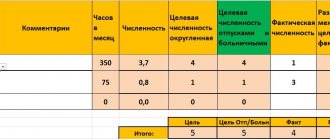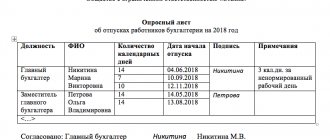Our editor received a letter with a question about working on a “every three days” schedule. A reader asked how long a shift should be - after all, you can’t work 24 hours without lunch? Indeed, some organizations require workers who will work around the clock - security guards, salespeople, etc. And of course, it is necessary to properly organize the work process for them so that the norms of labor legislation are observed. Can a shift last 24 hours or does it need to deduct lunch time? Which accounting period is best for this mode of operation? Do I need to draw up schedules and introduce them to them a month before the introduction? What is the peculiarity of remuneration when working “in three days”? You will get answers to these and some other questions by reading the article.
Who should not be included in the work schedule every three days
The work schedule “in three days” cannot include workers who are subject to prohibitions and restrictions established by labor legislation:
- a ban on working on the night shift (for example, for pregnant employees under Part 5 of Article 96, Part 1 of Article 259 of the Labor Code of the Russian Federation);
- limitation on the duration of daily work (for example, for minor employees under Article 94 of the Labor Code of the Russian Federation).
Useful information from ConsultantPlus
In the materials of the legal reference system you will find the necessary tips:
– What are the features of the working hours of a minor worker; – Guarantees for pregnant women at work.
How to correctly create a work schedule every three days
The schedule is drawn up as a separate document. It has three important functions:
- control: the schedule helps to track the standard working hours for each employee;
- informative: from the schedule, employees learn about work shifts and rest days, the start/end of working hours and rest time;
- coordinating: using the schedule, the work of employees is regulated;
It is better to draw up a schedule for the entire accounting period at once.
The schedule usually indicates:
- the period for which it was compiled;
- Full name and position of employees;
- distribution of working days during the month;
- other necessary information at the discretion of the employer.
The work schedule “in three days” might look like this:
Sample schedule of a day in three
We comply with the standard working hours when drawing up a schedule every three days
The first thing an employer needs to pay attention to when drawing up a work schedule is compliance with standard working hours.
The work schedule “in three days” does not allow the employer to comply with the requirement of Art. 91 of the Labor Code of the Russian Federation to the normal working hours, which is no more than 40 hours per week. This problem can be solved by introducing summarized working time recording for such employees (Part 1 of Article 104 of the Labor Code of the Russian Federation).
In case of summarized accounting, the duration of working hours for the accounting period (month, quarter or other periods) should not exceed the normal number of working hours.
Summarized recording of working hours allows the number of actually worked hours in one day or one week to exceed the norm. This excess is compensated by reducing the number of working hours during other days or weeks within the reference period.
The duration of the accounting period is determined by the employer. By law, it cannot exceed:
- 3 months - to record the working time of employees engaged in work with harmful and (or) dangerous working conditions;
- one year for other employees.
Salary
First, let us recall that wages are established by an employment contract in accordance with the current employer’s remuneration systems, which include:
- the size of tariff rates, salaries (official salaries);
- additional payments and allowances of a compensatory nature, including for work in conditions deviating from normal;
- systems of additional payments and bonuses of an incentive nature;
- bonus systems, –
- and are established by collective agreements, agreements, local regulations in accordance with labor legislation and other regulations.
Why is it important?
Because the employer needs to decide on the procedure for calculating wages when recording working hours in total. Since the number of working hours for employees with summarized accounting of working hours for the accounting period (quarter, half-year, year) will differ in different months, it is best to calculate wages in each month based on the number of hours worked.
You may ask: what about the salary? If you pay a certain amount, you don’t need to count anything else. Yes, some employers believe that this is the easiest option. However, the salary when accounting for working time is summarized serves as the basis for calculating the rate per hour of work. This means that the accrued wages will reflect the difference in the number of shifts worked by employees of the same qualifications for the same month.
There are two options for calculating the hourly rate based on salary:
1. The calculation is made taking into account the standard working hours for a given month according to the production calendar. In this case, the hourly tariff rate will be different in different months of the accounting period.
Example 1
Let's calculate the hourly tariff rate for June 2021, if the employee's salary is 30,000 rubles.
According to the production calendar, the standard working hours for a 40-hour workweek in July 2021 is 168. Accordingly, the hourly tariff rate in July will be 178.57 rubles/hour (30,000 rubles / 168 hours). In August 2021, with a higher standard number of working hours, the hourly rate will be lower - 163.04 rubles / hour (30,000 rubles / 184 hours).
2. The calculation is made based on the average monthly number of working hours for the year. In this case, the tariff rate is determined once and remains unchanged throughout the entire calendar year. In this case, the employee’s salary will depend only on the number of hours worked in each month.
Example 2
Let's calculate the hourly tariff rate for an employee's salary of 30,000 rubles.
First, we determine the average monthly number of working hours per year. There are 164.5 of them (1,974 hours according to the production calendar / 12 months).
The hourly rate will be 182.37 rubles/hour (30,000 rubles / 164.5 hours).
Please note that the procedure for determining the hourly rate is not fixed by law, so it must be enshrined in a local regulatory act of the company or a collective agreement (Letter of the Ministry of Health of the Russian Federation dated July 2, 2014 No. 16-4/2059436).
Once we determine the hourly rate, we can calculate the employee's salary. To do this, you need to multiply the rate by the number of hours worked in a particular month.
note
If an employee has fully worked his monthly quota according to the production calendar, there is no need to determine the hourly rate - you just need to calculate the salary. If you calculate wages taking into account the tariff rate, most often the salary amount will not be obtained (the difference arises due to rounding).
It is more expedient to determine the hourly rate by dividing the employee’s salary by the average monthly number of working hours, depending on the length of the working week in hours. With this calculation of overtime pay (at night or on non-working holidays) for an equal number of hours worked in different months, the employee will receive the same pay.
Breaks in work when scheduled every three days
The second important nuance is the competent organization of the employee’s work. During working hours, he is entitled to food breaks and other regulated periods of rest, since without this, for 24 hours in a row, it is difficult for an employee to perform labor functions effectively and fully.
Labor legislation also provided for this nuance, stipulating the employer’s obligation to provide the employee with breaks for rest and food during the working day. This period of time is limited: no less than 30 minutes and no more than two hours per working day. These breaks are not included in working hours (Article 108 of the Labor Code of the Russian Federation)
Time restrictions provided for in Art. 108 of the Labor Code of the Russian Federation, every employer is obliged to comply. The specific duration of breaks and the time they are provided within 24 working hours are prescribed in the PVTR. For example, you can set two breaks of 60 minutes, four breaks of 30 minutes, or some other combination of number and duration.
If, due to production (work) conditions, it is impossible to provide a break, the employer is obliged to provide the employee with the opportunity to rest and eat food during working hours (Article 108 of the Labor Code of the Russian Federation). A list of such work, as well as places for rest and eating are established in the PVTR.
Taking into account the above, with a work schedule of “every three days”, the employee’s time sheet may show either 24 hours (in a situation where there are no breaks excluded from working time due to working conditions) or a shorter period of time (for example, 22 hours, when the employee can be absent from work). places and two-hour breaks will not be included in working hours).
Does a store security officer have the right to use physical force?
Yes, it has. Art. 16 of the law in question directly indicates this, but there are a number of conditions and nuances that the security guard must comply with so that his actions remain within the legal framework.
Firstly, the security guard is obliged to use physical force strictly in cases where he has grounds for doing so. In our case, this can only be the suppression of offenses and forcing the person who committed it to remain within the store until he is handed over to the police.
Secondly, there is a clear procedure for using physical force - warn about its use, minimize the harm caused, provide first aid. The security guard must balance the resistance provided with the volume of actions he is performing. Under no circumstances can he exactly swing his fists left and right, but he can truss up a violent citizen and force him to wait for the police to arrive.
“They’ll merge us anyway.” Ford leaves Russia in Russian style - ignoring workers' strikes
Open taking of money without the use of weapons
This is what the guards call the fine system.
What does the Labor Code provide for negligent employees? Reprimand, severe reprimand, dismissal. But private security companies have their own territory, their own laws, which they can introduce or change whenever they want.
Private security company "Garant" in the village of Inozemtsevo. During daily duty, the security guard is allowed 2 hours of rest (according to the Labor Code, even with round-the-clock duty, the employee has the right to 4 hours of rest), but at the same time they are paid for 22 hours of work. The “body” is on the object and in the form, but at the same time it seems to be absent!
If you arrive 15 minutes before you take up your post, you will receive a fine of 500 rubles, because the scam starts half an hour before your shift.
Private security company "Vympel" To receive weapons and formation, you must show up at 7.30, or even earlier. Ten shifts cover 5 hours. Nobody thinks to pay for them.
"Enhanced Security Measures"
Departmental security is weakening everywhere, coming to naught, and it is very expensive for the enterprise. Increasingly, reputable institutions (even banks) use private security services.
How this happens can be seen in the example of the security service reform at the North Caucasus Federal University (NCFU).
With whom to agree on the schedule and when to familiarize employees with it
According to the general rules, work schedules must be coordinated with the trade union body and employees must be familiarized with it against signature no less than 30 days before the schedule comes into effect.
However, for the “in three days” schedule, these requirements are not applicable. Coordination with the trade union and written familiarization with the schedule at least 30 days in advance are required when drawing up a shift schedule - when employees work in two, three or four shifts and replace each other at the workplace during the day (Article 103 of the Labor Code of the Russian Federation).
With a “every three days” schedule, no one replaces the employee during the working day, that is, work in this mode is not considered shift work. This means that the employer has no obligation to agree on the schedule and comply with the deadlines for familiarizing employees with it. Although it is in the employer’s interests to comply with these requirements.
The employer has the right to set the period for familiarization of employees with the “every three days” schedule at its discretion, recording it in the PVTR or other local act. This will help to promptly resolve issues related to their workload with employees and avoid unnecessary proceedings.
What to include in employment contracts and PVTR when introducing a schedule in three days
An employer cannot limit itself to just drawing up a work schedule “in three days.” The law requires adjustments to be made to the company’s local regulations and employment contracts with employees if such a regime is being introduced in the company for the first time.
The procedure for introducing summarized recording of working time is prescribed in the internal labor regulations (Part 4 of Article 104 of the Labor Code of the Russian Federation). If summarized accounting is introduced in a company for the first time, the employees affected by this must be notified in writing at least two months before the introduction of this form of accounting (Article 74 of the Labor Code of the Russian Federation).
The specifics of the work regime of employees hired to work every three days must be specified in employment contracts (Article 57 of the Labor Code of the Russian Federation). In particular, it needs to reflect (paragraph 6, part 2, article 57, part 1, article 100 of the Labor Code of the Russian Federation):
- length of the working week (working week with days off on a rotating schedule);
- the order of alternating working days and weekends (determined by the work schedule).
- duration of daily work, start and end times of work, time and duration of breaks in work;
- accounting period, if summarized accounting of working time is introduced (part 1.2 of article 104 of the Labor Code of the Russian Federation)
Template for wording in an employment contract:
If the employer belongs to micro-enterprises and has refused to adopt local regulations (including work schedules), all the necessary features of the “every three days” work schedule should be specified in the employment contract according to the standard form (Parts 1, 2 of Article 309.1, Art. 309.2 Labor Code of the Russian Federation).
How to pay for work according to a schedule in three days
Payments to an employee working in the “every three days” mode include:
- payment for hours worked;
- additional payment for night work;
- payment for work on non-working holidays;
- overtime pay;
- payment for hours lost due to the fault of the employer.
Night work is work in the period from 22.00 to 6.00 (Article 96 of the Labor Code of the Russian Federation), each hour of which the law requires payment at an increased rate (Article 154 of the Labor Code of the Russian Federation). The minimum additional payment for night work is 20% of the hourly tariff rate (salary) for each hour worked (Resolution of the Government of the Russian Federation of July 22, 2008 No. 554). The specific amounts of the “night” supplement are established by a collective agreement, local regulation or employment contract.
, work on a weekend or a non-working holiday is paid at least double (Article 153 of the Labor Code of the Russian Federation). For the “in three days” schedule, you need to take into account the following nuance: if according to the schedule the working day falls on a regular day off (for example, Sunday), the salary is accrued in a single order, but if the employee goes to work on Sunday not according to his schedule at the request of the employer, this day must be paid at an increased rate.
Sleeping during working hours
Long breaks for sleep during a shift, including in the “every three days” mode, are not provided for by law. Therefore, if an employee sleeps for several hours at night, this time is considered working time and must be paid in accordance with the general procedure.
A similar conclusion is confirmed by judicial practice. Thus, according to the materials of one of the cases, a citizen’s job duties included guarding a fenced parking lot. An agreement on full financial responsibility was concluded with the employee; he worked in the “every three days” mode.
When a vehicle was stolen while this person was on duty, and the employer presented claims to his employee for damages, the citizen insisted that he was not to blame for what happened: he did not see how the theft was committed because he was sleeping.
The court sided with the employer: while performing his job duties and protecting the values entrusted to him, the citizen had to be aware of and foresee the onset of negative, harmful consequences that occurred as a result of his improper performance of official duties (decision of the Noginsk City Court of the Moscow Region dated October 2, 2012, civil case according to the claim of the Limited Liability Company “Trading House “Biserovo” against V.Yu. Novikov).
How will an employer be punished for miscalculations with the schedule and organization of work on a 24/7 schedule?
An employer who violates labor laws will face a warning or an administrative fine (Part 1 of Article 5.27 of the Code of Administrative Offenses of the Russian Federation):
- for individual entrepreneurs and officials - from 1,000 to 5,000 rubles;
- for companies - from 30,000 to 50,000 rubles.
For example, such liability awaits an employer who introduced the “every three days” work schedule in accordance with Art. 74 of the Labor Code of the Russian Federation, but did not notify employees of the changes at least two months in advance.
If the employment contracts with employees do not specify in detail the working hours when it is individual for the employee, and are not recorded in the PVTR, liability will arise under Parts 4, 5 of Art. 5.27 Code of Administrative Offenses of the Russian Federation. Amounts of fines under this article:
- for individual entrepreneurs - from 5,000 to 40,000 rubles.
- for companies - from 50,000 to 200,000 rubles,
- for officials - from 10,000 to 20,000, and in some cases the manager faces disqualification for up to 3 years.
Requirements, restrictions and prohibitions
In order for the work of employees working on a daily schedule to fall within the framework of the law, the employer needs to focus on the requirements established for such work and comply with a number of restrictions (Articles 91, 103, 110 of the Labor Code of the Russian Federation):
If the employer, when organizing work on a daily schedule, ignores existing requirements and prohibitions, the efficiency of the company and the productivity of employees, as well as their health, will deteriorate. And violation of labor laws may result in administrative penalties under Art. 5.27 Code of Administrative Offenses of the Russian Federation.
Let's sum it up
- The work schedule “in three days” is drawn up as a separate document, which employees are introduced to upon signature.
- It cannot include employees who are subject to prohibitions and restrictions provided for by labor legislation (pregnant employees, minors, etc.);
- All schedule parameters (length of the working day, start and end times of work, time and duration of regulated breaks) must be specified in the PVTR, local acts or employment contracts.
- For failures in organizing work according to the “every three days” schedule, the company faces fines, and the manager can be disqualified for up to three years.
Last working day upon dismissal
The day of termination of the employment contract is the last day the employee goes to work (Part 3 of Article 84.1 of the Labor Code of the Russian Federation). But what if the last working day falls on a shift?
For example, according to the schedule from 8 a.m. on the 28th to 8 a.m. on the 29th, an employee should be on duty, but two weeks before that he wrote a statement asking to dismiss him on the 28th.
Should a citizen work this entire shift? Does he need to go to work before 0 o’clock on the 28th, and how can he make final payments if the accounting department is open until 6 o’clock?
The employee must complete his/her shift. This answer follows from the explanations of regional labor inspectorates (see, for example, https://git78.rostrud.ru/18697/37386.shtml, paragraph 10). Therefore, the day of dismissal will be the 29th. On this day, the employer is obliged to issue a work book and make the final payment.
If the employee does not come for the work book on this day, the employer must send him a notice of the need to appear for this document or agree to send it by mail (Article 84.1 of the Labor Code of the Russian Federation). This requirement is contained in Article 84.1 of the Labor Code of the Russian Federation.








